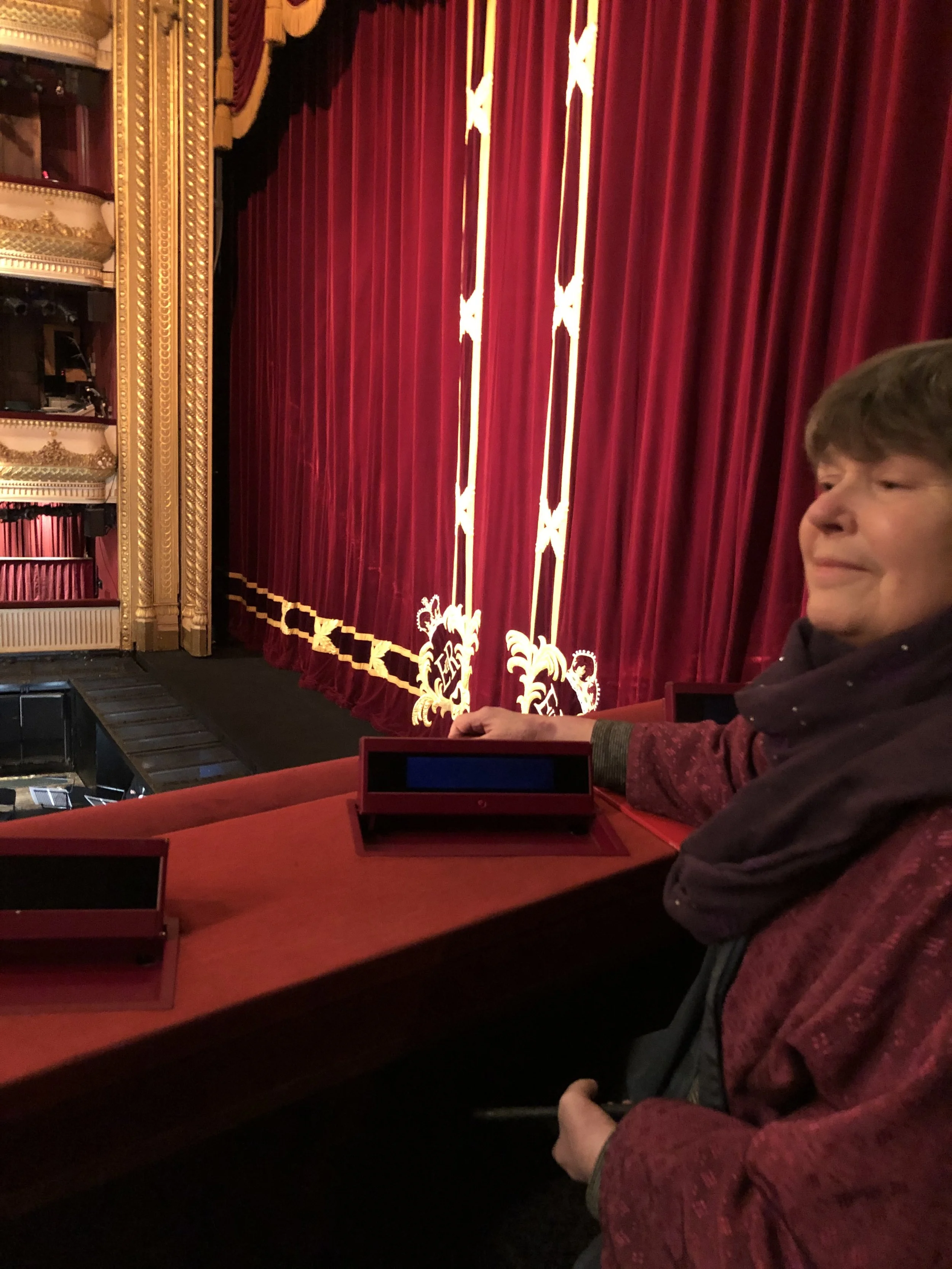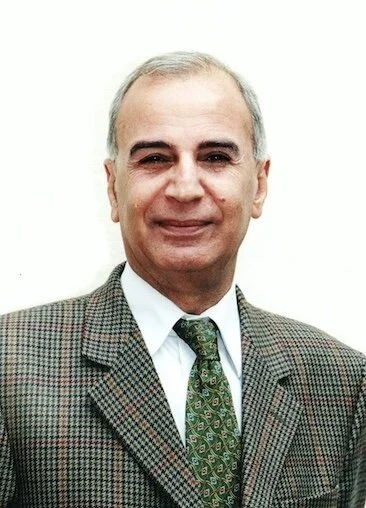Music .. Mind and Soul Love affair
My late wife Judy at Royal Opera House in London where we attended Verdi’s “La Travita”
Why did classical music attract me at an earlier age in a family that knew nothing about music?
I brought up in a religious family in a conservative and semi-illiterate rural environment where music was not familiar except what was broadcasted from a single radio in one of three teahouses in the town, or simple folk songs and wedding ceremonies that take place, perhaps once a year, where the drum and Zoorna (a kind of primitive Obo) played, beside a few religious chants and praises are sung. So, Why did I choose classical music and not what was available there from entertainment and popular one? But, do we choose the music or does it choose us?
Classical music is an alien plant to the soil of the East. It comes from the West, it is one of the pillars of Western civilization. Because it was born from the womb of the Church, It has its sacred aspect, as it is characterised by majesty and loftiness. It appeals to the soul and mind. While oriental music is characterized by emotional fluidity, it addresses the instinctive senses, not the mind.
About The Author:
Wahab Weli is a researcher in comparative musicology who lives in London, United Kingdom. He established this website primarily to promote different cultural issues on a free and non profitable basis.
I did not choose classical music above oriental one, no. I eagerly listen to Asmahan's song and consider her the finest female voice in Arabic music. I also enjoy many of Umm Kulthum's songs, particularly those composed by Sheikh Zakaria Ahmed and Riyadh Al-Sunbati. Listen to her song "Al Owila fil Gharam" composed by Zakaria Ahmed, then the song "Anta Omri" composed by Abdel Wahab, and you will understand what I mean.
Picture: Asmahan the finest Arabic voice
Music of Mind
Classical music appeal to the mind, and requires knowledge and practice of listening because its recipient uses the auditory imagination to elicit feelings and sensations through sound, unlike the art of painting or reading books that conveys thoughts and feeling through the sense of sight. Classical music requires reading its development history and the characteristics of its melodic and harmonic structures at every stage of its development. How it was born from the womb of the church, how it grew up and left the church motherhood and moved to the vast space. What stages did it go through, from Gregorian chants to Renaissance, Baroque, Classical, Romantic and Neoclassical music? Like every knowledge, Classical Music awareness does not come from a single source but a diversity of fields. It has a cumulative process, composed and enriched by different sources.
I grew up in a conservative rural community with no traces of music education in its curricula. In a family, music has no place in daily life and a social environment where there is no easy way to deliver music.
Childhood Obsession
There was a large wooden battery-powered radio in one of the three cafés in my native town Daquq in northern Iraq, where I used to slip from my father’s grocery shop and walk closer to that café, especially during the noon prayer hours every Friday, when the Qur’anic recitation was broadcast through that device by the Egyptian reciters, such as Abdel Fattah Al-Sha’shai, Abul-maintain Al-Shuaishie’, Al-Hosari and others recited the Qur’an melodically according to the Modal scales. Their reading captivated me and stirred up a vague and ambiguous feeling through their melodic colourations and tonal passages. Also, religious songs were broadcasted on Radio Baghdad by Iraqi and Arab singers like Umkulthu and Abdulwahab.
Picture: Umkulthum
Playing Violin
When I was a student at the Teachers Institute in Kirkuk, I learned to play the violin from our music teacher at the institute, and I think his name was George Abdel Masih. The music curriculum at the institute consisted of one lesson per week, and it was limited to the teacher playing a few popular Arabic pieces. However, this did not quench my thirst, my ambition was to learn to play by myself, so I agreed with our music teacher to teach me to play the violin in private lessons outside the official working hours. I used to practise for hours a day to learn a piece of popular Arabic or Turkmen melodies.
We were a group of students from outside the city of Kirkuk staying at the boarding section of the institute of teachers who provided us with food and accommodations where each room housed a group of six or seven students. I was not allowed to play or practice my music while the rest of my colleagues were studying their lessons. The dining hall of the boarding house used to close after the students finished each meal. I asked the board supervisor if he permits me to practise my music in the dining hall after the fellow students finished their meals he received my request with enthusiasm and praised my hobby. He asked the guard to let me use the dining hall whenever I wanted to practice.
When I was appointed as a teacher at the middle school in my town I used to take my violin with me to the school playing for the classes pieces of melodies that were popular then, encouraging them to listen to music whenever there was an opportunity. I even tried to teach violin to some of my close relatives and friends, but my efforts did not bear much fruit.
Discovering Faure
When I started receiving a regular monthly salary from my job as a teacher, I bought a wooden framed PYE-made radio that worked on the batteries. Having such a device at home was an important event as I moved from station to station in search of music tracks, including foreign ones. I discovered, by chance, that the radio station of the Kingdom of Jordan has a program every day at one o'clock afternoon entitled "Poetry and Music", which consists of reading pieces of Arabic poems interludes of Western classical music. Perhaps that program was one of my early contacts with classical music, so I became attached to that daily program.
Sometimes I wonder if the piece of Elegie by Gabriel Fauré, which I listened to it, by chance, under a starry sky one summer night on the top of the roof of our house in Iraq is, in fact, one of the main elements that drew me into the realm of the classical music.
Picture: Gabriel Fauré
(from Internet)
In the hot Iraqi summer months, we used to sleep at night on the top roofs of the houses where temperatures dropes and a cool breeze comes from a wet rice field outside the town. There was no electricity then. Therefore no air conditioners or refrigerators were there. Our mud house consisted of two floors, so, in the hot summer months, we usually slept on the top roof of the second floor. I used to carry our heavy radio with me whenever we climbed up the stairs to bed on the second-floor roof and put it close to my bed to listen to the programs on the various stations before I went sleeping, and bring it down again in the morning.
Paul Tortelier, The prominent French cellist, playing Gabriel Fauré’s “Élégie”
Credit: YouTube
Composer of shy Music
Sleeping on the top roof of our mud house during hot summer months was sheer pleasure, not because of those refreshing cool breezes that blow gently after the sunset of a sultry day, but also the pleasure of lying in bed staring at the sky filled with billions of twinkling stars, like scattered pearls, or little lanterns hanging from the dark dome. So close they were to me was enough to stretch out my hand and grasp as much as of them.
On one of those magical nights, as I was moving the knob of our wooden framed Radio beside my bed from one station to another, my fingers suddenly jammed on one of the stations streaming from an enchanting melody by a cello and orchestra. It was captivating, melancholy, reverent music penetrating the heart softly and magically. I felt like I was praying inside a sacred dom that it would not end forever, but, of course, when it reached the end the broadcaster spoke in a language foreign to me, so I missed the name of the piece and the its composer. I kept repeating this tune to myself, especially the cello theme, for years after I settled in London.
Composer of Shy Music
One day I was in the ”Asharq al-Awsat” newspaper in London prepairing the material for the cultural page I was the responsible editor for when the Iraqi writer and intellectual Najeeb Al-Manie visited me brnging his weekly material to be published. His materials were cultural follow-ups, mixture of literature, classical music, and excerpts from his memoirs. During our conversation, I casually mentioned the story of that magical melody that captured my heart one summer night on the roof top of our house in Iraq he jumped from his seat excitingly: Do you realy not know this music? It is the "allegie" of the French coposer Gabriel Fourier. Then he started talking about the composer and his music. He was well versed in the affairs of classical music, and advised me to listen to his music carefully, saying: you will feel a tone of sorrow and shyness in his music.
The next day I ran to the famous HMV music store on Oxford Street in central London and bought two CDs; a selection including "Elegy" and a collection of his songs "Chanson" still keep them. I hope it is not an exaggeration that this piece of Foré was one of the sources that drew me to the classical music realm.
Music is Universal Language







